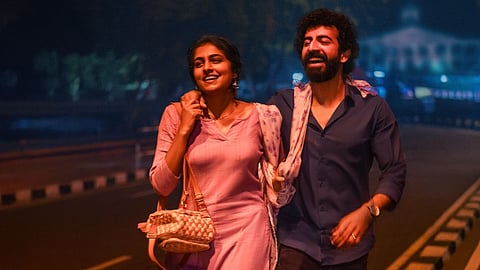Ithiri Neram Movie Review: An imperfect yet sincere look at love that never truly left
Ithiri Neram Movie Review(3 / 5)
There is something profoundly moving about watching two people who once meant the world to each other meet again after years apart. In Prasanth Vijay’s Ithiri Neram, that reunion between Anish (Roshan Mathew) and Anjana (Zarin Shihab) forms the emotional nucleus of a film that is as much about the unspoken as it is about words. What begins as a casual meeting between former lovers stretches into a long, boozy night of rediscovery, unfolding with warmth, awkwardness, and the heavy undertone of all that was left unsaid.
Director: Prasanth Vijay
Writer: Vishak Shakti
Cast: Roshan Mathew, Zarin Shihab, Nandu, Anand Manmadhan, Jeo Baby, Athulya Sreeni
Vishak Shakti’s writing gives these encounters remarkable depth. The dialogue feels effortless, flowing like conversations that have waited years to resume. Anish and Anjana are no longer the carefree young people they once were. Life has happened to them, bringing careers, families, disappointments, and compromises, and that history seeps into every exchange they share. Their talk carries the candour of two people who have shed pretence. What stands out is how naturally they slip into their old selves, as if familiarity had simply been lying dormant all these years. The film shines brightest in these moments of conversation, which are both tender and painfully honest.
Roshan and Zarin deliver delicately layered performances. Roshan captures Anish’s inner restlessness and guilt with quiet restraint, while Zarin brings both vulnerability and defiance to Anjana. Together, they make every look, pause, and smile feel genuine. Their shared chemistry is beautifully understated, never loud or performative but quietly magnetic. You sense a deep familiarity in the way they look at each other, as if still carrying the rhythm of an old conversation that never really ended. Even in moments of silence, there is a charge between them, a soft ache that speaks to everything they once shared and everything they lost.
When Anish likens his marriage to a “replacement therapy,” it becomes a striking moment of truth, a quiet confession of how he tried to fill an emotional void rather than heal it. It reflects the way many people move on, not out of readiness but out of exhaustion, seeking comfort, stability, or distraction when love itself feels too heavy to hold. In his words, there is no bitterness, only the weary honesty of someone who realises that companionship can sometimes soothe what love once stirred, even if it never truly replaces it.
Rakesh Dharan’s cinematography enhances the film’s intimacy, presenting Trivandrum in textured shades that mirror the nostalgia running through the story. Basil CJ’s music complements this tone perfectly, with the opening track 'Neeyorikkal' standing out as a track that, in hindsight, feels like an extension of Anjana and Anish’s emotional rhythm. As the night deepens and the alcohol takes effect, the film allows its characters to let go of inhibition, politeness, and the masks they wear in daily life. The decision to anchor their reunion around drinks gives Ithiri Neram a sense of immediacy. With each sip, their guard lowers, and what emerges is not merely a retelling of an old romance but a candid exploration of why people drift apart and what lingers when the dust settles.
Where Ithiri Neram falters is after this emotionally rich stretch. Without revealing too much, the film takes an extended detour that goes on longer than it should. The tonal shift from deep introspection to a lighter, more outwardly comic rhythm feels abrupt, momentarily distancing us from the soulful intimacy that had been built between Anish and Anjana. Yet this section remains watchable, largely because of Nandu’s understated charm as the ageing driver Rajan and Anand Manmadhan’s pitch-perfect timing as Chanchal. Their effortless Thiruvananthapuram slang and local humour lend authenticity and lightness to an otherwise meandering portion. Jeo Baby’s performance as a local auto rickshaw driver, though expressive, feels less natural in comparison, and his Thironthoram dialect slips into caricature.
Despite these missteps, the film regains emotional footing as it moves towards its conclusion. Prasanth brings Anish and Anjana’s journey to a close that feels both satisfying and realistic. It is not about rekindling a lost romance but about finding peace in its memory. There is a quiet maturity in how the film acknowledges that closure does not mean forgetting, that some people remain a part of you no matter how far life has taken you from them.
While Ithiri Neram shares thematic similarities with films like C Prem Kumar's 96, it distinguishes itself by embracing the flaws of its characters rather than idealising them. Anish and Anjana are messy, imperfect individuals trying to make sense of what still binds them. Their story feels relatable because it does not try to romanticise life but finds beauty in the everyday. Love lives here in the simple moments we often overlook, in awkward silences, unfinished sentences, and small acts of care that speak louder than words.
In the end, Ithiri Neram lingers as a film that understands the fleeting nature of reconnection and the quiet ache of moving on. Prasanth and Vishak invite us into a world where love does not demand permanence, only honesty, even if that honesty lasts for just a little while.

